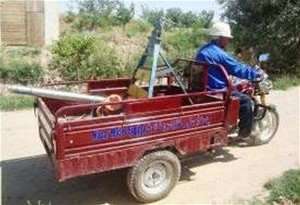
A water supply technician takes a replacement pump to repair the Sayed Esmail Balkhi water network deep well. The repair restored water service for about 1,250 residents.
USAID/CAWSA
USAID support allows the Afghan Urban Water Supply and Sewerage Company to make repairs quickly.
23 SEPTEMBER 2010 | MAZARI SHARIF, AFGHANISTAN
The Mazar Strategic Business Unit (MSBU) of the Afghan Urban Water Supply and Sewerage Company has only 13 field technicians to provide general maintenance and emergency repair services. These technicians cover 17,000 connections across 275 kilometers of pipes that provide water to more than 210,000 people. With so many people depending on this network for water service, it is important for the technical staff to respond to emergency calls, investigate problems, and get parts and equipment to work sites as quickly as possible.
In the past, MSBU employees had to hand carry parts and equipment on foot or on bicycles, or they depended on suppliers to deliver parts to work sites. Many sections of the network are 40 or more years old, so there is always a lot of repair work to do.
Beginning in 2008, USAID started to provide support to the MSBU through its Commercialization of Afghanistan Water and Sanitation Activity (CAWSA) project. Recognizing the importance of improving the productivity of the work force, MSBU Director Engineer Jamil Maseh applied to CAWSA’s small grants program to obtain a few small vehicles to facilitate water network inspections and transport crews and equipment to work sites. The team procured six motorcycles and tricycle delivery and inspection vehicles.
This equipment has helped speed up the inspection work and the response time to investigate emergency calls from customers. Engineer Jamil has estimated that the time needed to respond to emergencies and deliver equipment and parts to restore water service has been cut by more than 70 percent.
Not only can field crews make urgent repairs more quickly, but their efficiency has increased to allow for more network inspections and preventive maintenance. These proactive practices will reduce water service interruptions in the future.
Engineer Jamil has expressed the department’s appreciation for USAID support and is pleased that his staff is able to provide customers with the best service available.







Comment
Make a general inquiry or suggest an improvement.